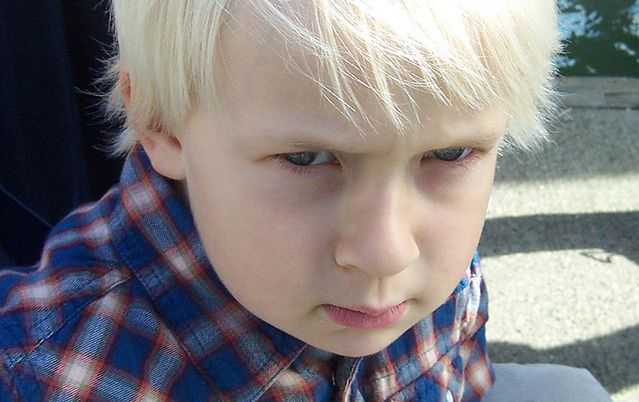Empathy
Why Are Kids So Mean?
Even nice kids can sometimes be nasty due to empathy blind spots.
Posted March 31, 2018 Reviewed by Devon Frye

Insults. Exclusion. Gossip. Ignoring. Taunting. Hitting. Kicking. Shoving. The list of ways that kids can be mean to each other is long, varied, and heart-breaking.
Sometimes, meanness happens impulsively, in the heat of the moment. Kids feel angry or hurt and lash out in ways that they wouldn’t if they were calmer. Sometimes the meanness is unintentional, the result of a misunderstanding or outside circumstances. What’s more concerning is when children are deliberately mean.
School-age children definitely know right from wrong. If you ask them questions such as, “Is it OK to call someone mean names?” or “Is it kind to hit someone?” they know the answer is no. But kids who know better and are usually kind to their friends can sometimes act in casually cruel ways due to what I call “empathy blind spots.”
Empathy blind spots happen when children decide that certain people’s feelings don’t “count” and therefore feel justified in being mean to them. Empathy blind spots allow kids to make excuses for being unkind. They insist, “He’s so annoying!”; “She’s weird!”; or “Nobody likes him!” Believing these excuses, they tell themselves that the mean behavior is acceptable, unavoidable, or even righteous.
Research on moral development shows that parents can play an important role in helping children think through wrong-doing in a way that helps them grow and learn (e.g., Recchia & Wainryb, 2014). This involves a delicate balancing act between helping children recognize when and how they have hurt someone but also encouraging them to believe that they can move forward in positive ways.
Here are some ideas for how to help your child move beyond empathy blind spots:
1. Acknowledge your child’s thoughts and feelings.
Your child first needs to feel heard and understood in order to be able to hear and understand other views. While it’s tempting to leap straight to making your point, slowing down and acknowledging your child’s view of things will create a connection that quiets the “But… but… but…” justifications running through your child’s mind and helps your child be more open to correction. You could say, “It bothers you when she does that” or “You don’t like him because…” or even “I understand that lots of kids were doing the same thing.”
2. Vividly describe the other child’s feelings.
Perspective taking is a skill that children develop only gradually. You can help by painting a vivid picture of how the other child might be feeling. Go for the heartstrings! You could say something like, “It must be lonely for him to be the new kid and have no one to sit with at lunch,” or “If I’d been in that situation, I would have felt so scared and embarrassed! It’s horrible to feel like everyone is looking and laughing at you!”
In some cases, you may need to explain something about the other child’s circumstances to encourage empathy. “He wears the same shirt a lot because his family doesn’t have much money. That’s not something he can change. I bet he feels hurt and angry when kids tease him about his clothes,” or “She talks and moves constantly because she has ADHD, so it’s very hard for her to sit quietly. It must be so hard to feel like kids are always yelling at her and telling her she’s annoying for something she can’t control!”
You may also be able to draw connections between the other child’s experience to something your child has gone through. “Remember last year, when those kids were making fun of you and saying that you stink at soccer? You felt helpless, hurt, and angry, especially when they kept saying, ‘Can’t you take a joke?’ I bet that’s how your classmate is feeling now.”
3. Clearly state your expectations.
Effective parenting involves a combination of warmth and limits. We need to have reasonable expectations for how our children behave and to communicate these clearly. You could say, for example, “You don’t have to like him, but I expect you to be kind to him,” or “Even if other kids are being mean, I expect you to do the right thing,” or “You’re in charge of you. Even if she does something bad, I expect you to make good choices.”
4. Find ways to move forward.
While we need to correct bad behavior, we don’t want to leave our kids stuck believing they’re “bad” people. Everyone makes mistakes. The important thing is what happens next. In some cases, you may need to encourage your child to apologize. Try asking, “What could you do to make him feel better?” or “How can you let her know that you’re sorry for what you did?”
You may also need to help your child brainstorm what to do the next time a particular situation comes up. Social situations can be complicated. For instance, being the only one to speak up directly when someone is being bullied could make your child become the target. It might make more sense to report what’s happening to a teacher.
Sometimes children justify excluding other kids because those kids disrupt group activities (Recchia, Brehl, & Wainryb, 2012). Figuring out how to balance the needs of the group, the rights of an individual, and moral values takes thought and effort. The answers aren’t necessarily simple or obvious. But you can help your child figure things out by asking questions such as “What could you do in that situation that’s fair to everybody?” or “How could you respond when he does that to give him a chance to be included but also let everyone else enjoy the game?” Thinking through these issues outside the heat of the moment can prepare your child to make kinder choices.
Related Posts
References
Recchia, H. E., Brehl, B. A., & Wainryb, C. (2012). Children's and adolescents’ reasons for socially excluding others. Cognitive Development, 27(2), 195-203.
Recchia, H. E., & Wainryb, C. (2014). Mother-child conversations about hurting others: Supporting the construction of moral agency through childhood and adolescence. Talking about right and wrong: Parent-child conversations as contexts for moral development, 242-269.




